QuestionWe rescued a dwarf lop ear bunny. She is 80% blind and 100% deaf.She is a very sweet bunny but the cleaning issue has gotten worse over the past 4 months. We've had her for 8 months. Originally she was found in the road not far from a bunny farm(not good). I don't know why she is getting so dirty. she has a very large cage and she also has an outside porch. She is about 1 year old, how much should she way and what can I do to help her dirty butt problem????
AnswerHi Brandi,
First, you have hit a special place for me since I rescue "special needs" rabbits. The dwarf lop...aka Holland Lop.... is a particularly special breed of rabbit to me. And I get what you mean by finding her near a bunny farm....she may have escaped accidentally, but if not, let's hope the person(s) responsible have to answer for that down the road.
I have several blind, deaf or blind and deaf rabbit here. Some were born that way and others became sick and were improperly treated. I suspect that to be the case here. Lops are very prone to bacterial and/or yeast infections in the middle and/or inner ear. Hollands also have very narrow ear canals. When you combine the lop ears with small canals, air flow into the canals are very restricted and makes prime grounds for breeding harmful bacteria. If an ear infections is not promptly and aggressively treated, it can migrate to the brain stem and cause serious neurological issues. We have "Snow White"....a rescue that we have had for nearly a year. Her brain stem damage caused her to become blind and deaf....and she has an additional concern called "positional nystagmus" in which she flat spins like a rodeo bull. You might be questioning why I mentioned all of this but there is a tie in to your problem.
There are several things that can cause a dirty butt. The most common issue is diet. An adult rabbit's diet should be primarily grass hay. She should have hay available at all times in unlimited amounts. Most people have this thing about timothy hay and only feed timothy hay. I feed all sorts of grass hays...timothy, orchard grass, brome, oat, etc. Rabbit's digestive systems have evolved over the years into what we call "hind gut fermentation". Their gut evolved to extract all the nutrients it could from the low quality grass, leaves and bark that are found in the wild (and our domestics are from wild rabbits in Europe....and the guts are the same in all small rabbits...even our cottontails). They have an organ called a "cecum" (and it might be that our ancestors were hind gut fermenters and our appendix is what is left of our cecum as we evolved). The cecum is a depository for undigested food, vitamins and bacteria beneficial to digestion. Rabbits practice "copragraphy" in which they can stimulate their rear end and the cecum will excrete cecotropes...aka night poops....in which they eat. If you actually see the cecals, they are very moist and smelly and may appear to be a strand of grapes. If the diet is too high in protein (too many or low quality pellets ot too many treats) the delicate balance of bacteria is disturbed and you can what appears to be an upset stomach and a poopy butt.
I would highly suggest having her checked for parasites. I find several parasites are common in rabbits like this that have been outside...even for a short time. This should be done under the supervision of a rabbit savvy vet. I routinely treat for worms. They don't always show up in a test called a "fecal float" so I treat for the most common worms (usually round worms but we have also seen pins and hooks). I do get a fecal because rabbits are also prone to a protozoan infection known as coccidia. It requires prescription medication to control...but in the real world, the drug only helps as it's the rabbit's own immune system that has to conquer protozoan infections.
Another possibility is a dental issue in which she can't properly chew. Holland Lops or any of the flat faced rabbits are quite prone to dental issues...most of the time the easily seen six incisors they have (four on the top arcade and two on the bottom arcade). The molars may require sedation and/or radiology to properly view. Remember I mentioned to keep hay in mine? Hay is not only essential for a good digestive system....it is also essential for the teeth. A rabbit's teeth are open rooted and grow constantly. They are to be worn down. They are worn down by tooth to tooth contact. If there is a problem with the teeth in which they don't line up correctly (occlusion), they won't make contact with each other and will overgrown (malocclusion). This can result in all sorts of problems. It's not how hard something is, it's how chewy it is. Watch your rabbit eat, she doesnt' chew up and down, it's side to side.
Having said all of that, here is my suggestions to start dealing with this issue.
>Closely monitor the diet. Offer her unlimited amounts of high quality grass hays (any hay a horse can eat, so can a rabbit). I can provide you with numerous high quality hay providers if you live in the US and I have some contacts in Canada. Offer pellets in very limited amounts. This should be a high quality (most discount and pet store food are not very good) pellet that is a true pellet....not one with the colorful junk food in it. Holland are usually very small...we feed our Hollands no more than 1/8 cup pellets per day....we offer pellets only to maintain weight and body conditioning. Pellets were originally meant for the meat rabbits to fatten them up. There is no such thing, regardless of claims, of a complete rabbit food using only pellets...there is no substitute for lots of loose hay. Offer greens in very limited amounts. No carrots, no fruit and especially no treats as most of them contain far too much sugar (yes, carrots in large amounts are not healty for rabbits). Sugar is the enemy of the bacteria in the cecum.
>I would offer a probiotic. This usually comes in a paste or a powder (I prefer the powder since it can be sprinkled on food or greens). This basically helps to reinforce the good bacteria in the gut. It does so by changing the pH in the gut....an adult rabbit's proper GI pH is 1-2. I use a product called Bene-Bac. It's available in most pet stores and vet clinics. It contains strains of L Casei and Enterococcus which really helps a gut.
>I would schedule and appointment with a rabbit savvy vet for a physical exam. Look closely at her teeth. I would advise to worm her. Most worms are easily treatable by a properly administered round or Fenbendazole (Panacur). I would do a fecal to look for coccidia. This is touger to treat and is most often treated with Sulfanomides. Using a probiotic such as Bene-Bac should be instituted when using any oral antitiotic in a gut stressed rabbit.
Hope this helps....don't hesitate to contact me again with any questions regarding this or any other issue with her. If you live in the US, I have a large listing of rabbit savvy vets. And again, you are a very special person for helping this little girl in her darkest hour. I can tell you from experience, the "special needs" like her, while needing more care, also respond to your compassion in a huge way. They know they have been given a second chance.

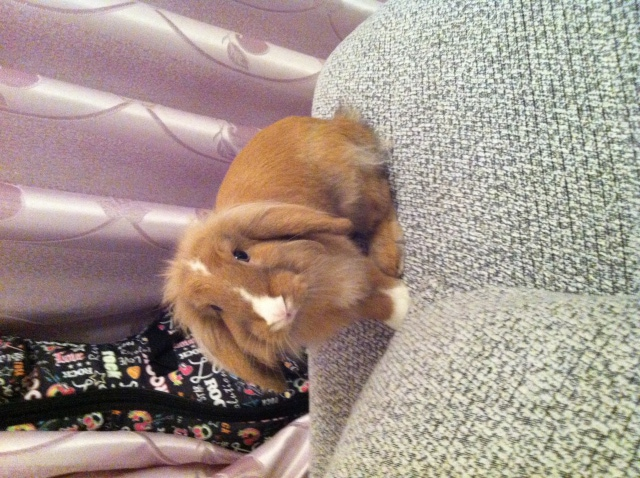 My rabbits diet
QuestionChocolate
QUESTION: Hi cat.. I have a mi
My rabbits diet
QuestionChocolate
QUESTION: Hi cat.. I have a mi
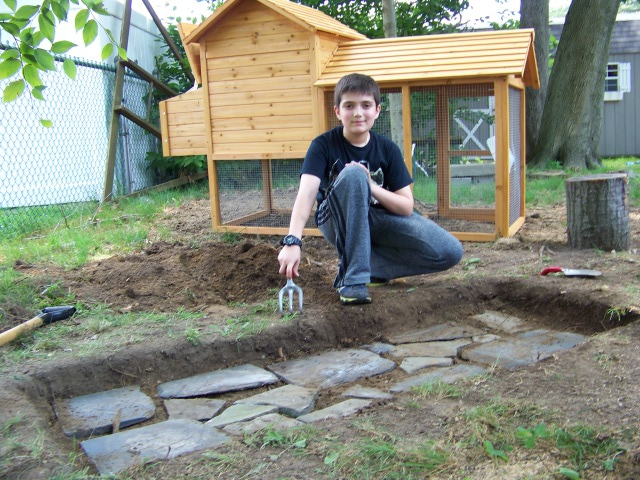 Litter pan training/use of bedding/digging?
Question
Bunny Hutch Base Finished Bunny Hutch &n
Litter pan training/use of bedding/digging?
Question
Bunny Hutch Base Finished Bunny Hutch &n
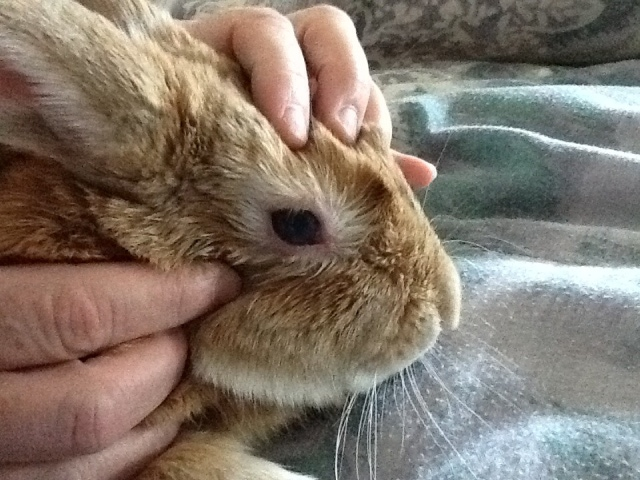 Bunny Eye
Question
Bentleys eye
Our 7 month old bunny Bent
Bunny Eye
Question
Bentleys eye
Our 7 month old bunny Bent
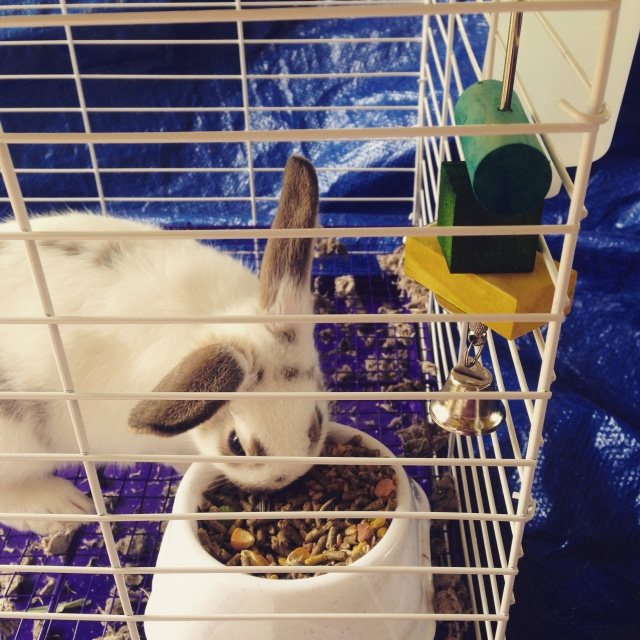 Deaf
QuestionQUESTION: Ok I have tried snapping at the ears
Deaf
QuestionQUESTION: Ok I have tried snapping at the ears
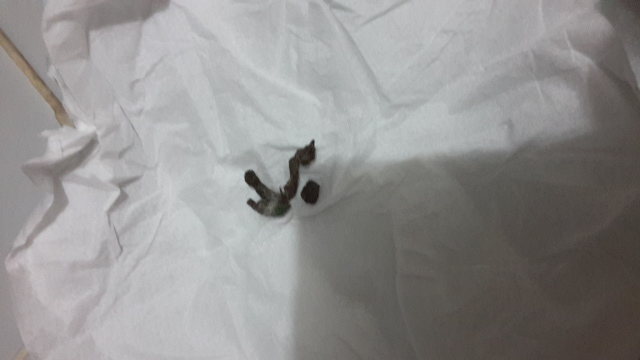 bunnys tummy looks so big and hard
QuestionQUESTION: Hai Cat,
I have a bunny is about 1 an
bunnys tummy looks so big and hard
QuestionQUESTION: Hai Cat,
I have a bunny is about 1 an